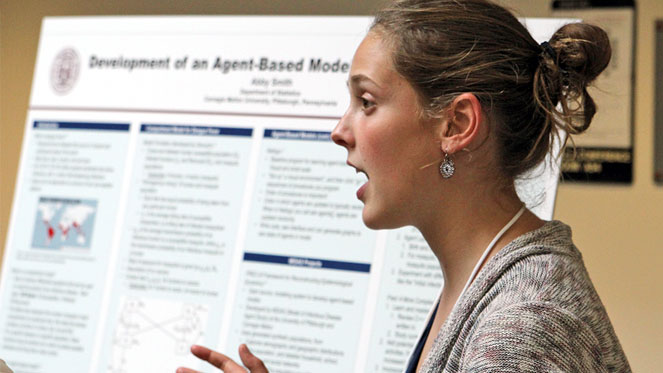Undergrads Show Off Their Research
By Emily Stimmel

In early November, roughly 70 students, faculty and staff gathered in the Baker Hall Coffee Lounge for the third annual Dietrich Undergraduate Colloquium (DUC). Since 2013, the colloquium has provided an opportunity for undergraduate students to immerse themselves in a topic of interest and present their research findings in a structured environment.
According to Bonnie Youngs, teaching professor of French and francophone studies in the Department of Modern Languages, this structure is a key part of what makes the DUC experience so valuable to students.
“Employers want people who can talk to non-specialists about their research,” Youngs said. “I always ask, ‘Can you explain it to your grandmother?’”
Twenty-two students made formal presentations or participated in poster sessions on topics ranging from American popular music festivals as youthful rites of passage to the development of an agent-based model for dengue fever and the role of rhetoric in forming a regional identity.
Some faculty mentors worked with students outside their areas of expertise, creating rich opportunities for learning on both sides.
“The DUC allows students to practice presentation skills without a lot of pressure, while creating relationships with faculty mentors who know nothing about their topic,” Youngs said.
Youngs mentored two first year students who helped familiarize her with the history of U.S. deployments abroad. Philip DeCicco (DC’19) and Sahana Thirumazhusai (DC’19) are both majoring in international relations and politics. Their presentation, “Predicting Avoidance Strategies for U.S. Military Actions in Foreign Countries,” analyzed patterns of U.S. military intervention.
“We are at the beginning stages of our research, but the wonderful thing about the DUC is that they wanted to showcase students at all stages of their work,” remarked Thirumazhusai.
Zora Gilbert (DC’16), who is majoring in linguistics and psychology and minoring in professional writing, is a two-time DUC participant. Gilbert co-presented with a friend before this year’s solo talk, “Classroom Conversation: Student Dialect Variation in On-Task Activities,” which addressed education, social equity and variations within the English language.
“Presenting someone else’s work was really good practice, because it got me comfortable with the environment at DUC,” Gilbert said.
Though all student presenters have at least one major or minor within the Dietrich College, their backgrounds are as diverse as the subject matter, representing all majors within the college, as well as architecture, chemical engineering and mathematical sciences.
Youngs added, “We have so many students in Dietrich who combine areas of study in amazing ways. I think that for students who haven’t begun thinking of research or creative endeavors that combine their interests and skills, the DUC is a great way to consider the many possibilities that being in Dietrich can offer.”
The event was open to the entire campus community. Youngs attributes the success of the event to the collaborative efforts of staff in the Department of Modern Languages and the Dietrich College Dean’s Office.
Presentations:
A Case Study of English as a Second Language
Lucy Pei, Global Studies
The Challenges of Learning Japanese Kanji
Noah Hermalin, Linguistics and Japanese
Classroom Conversation: Student Dialect Variation in On-Task Activities
Zora Gilbert, Linguistics, Psychology and Professional Writing
Constraining Stellar Multiplicity with Approximate Bayesian Computation
Eric Alpert, Statistics, Mathematical Sciences and Economics
Crachez du feu: une réponse à la perte d’identité
David Matvey, International Relations and Politics; and Ethics, History and Public Policy
Culture and Cultural Progression Through Documentary Photography and Social Psychology Analysis of Tamil Nadu, India
Rubini Naidu, Psychology, Photography and Pre-Med
French Online Course Student Behavior
Anusha Kukreja, Economics and Statistics
Akhil Prakash, Mathematics and Statistics
From Hippies to Hipsters: American Popular Music Festivals as Youthful Rites of Passage
Geneva Jackson, Global Studies
The Implications of Violence in the Middle Eastern and North African Region: An Analysis of Nationalism and Identity
Ashley Sobhani, Global Studies
Les Mariannes noires: An Investigation of Afro-French Female Identity Through Documentary Filmmaking
Kaytie Nielsen, Creative Writing and French
Leveraging Social Preferences to Increase Survey Participation
Xiyu Wang, Economics
Loneliness: How Our Drive for Connection Impacts Social Support Interventions
Joshua Swanson, Psychology and Statistics
Predicting Strategies for U.S. Military Actions in Foreign Countries
Philip DeCicco, International Relations and Politics
Sahana Thirumazhusai, International Relations and Politics
The Science Fiction Prediction: Understanding Our Reality to Question Our Future
Danielle Lehmann, Architecture and Creative Writing
Using Social Media to Foster Ideological Conflict Resolution
Satvika Neti, International Relations and Politics
When the Rich Demand the Vote: An Elite-Competition Approach to Selectorate Theory
Max Goetschel, Policy and Management; International Relations and Politics; and Economics
Posters:
Capital Determining Factors for Immigrant Business Owners
Shivanee Shah, Chinese Studies and Business Administration
Cascadia: Creating a Regional Identity with Rhetoric
Thatcher Montgomery, Technical Writing
Development of an Agent-Based Model for Dengue Fever
Abigail Smith, Statistics and Mathematics
Human Zoos: From the 19th Century Enclosures to the Contemporary Stereotypes
Sanjana Padmanabhan, French and Chemical Engineering
Improving Predictions of Ensemble Methods Using Distributions of Estimated Probabilities
Ronald Yurko, Statistics